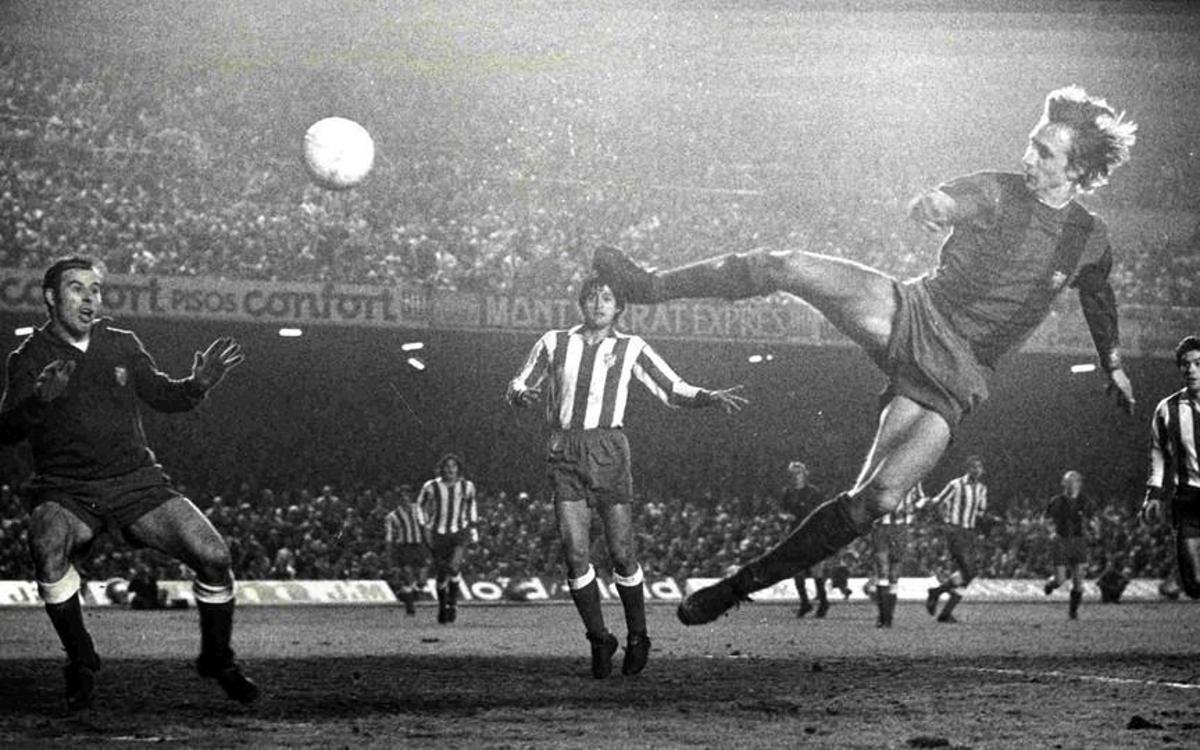1969-78. Cruyff and democracy
In 1969, Agustí Montal Costa won the elections and became president of the Club. His programme insisted on member involvement, and was committed to the idea that all members would see their opinions reflected through their votes. In 1973, Montal was re-elected president despite only the members' representatives being able to vote.
During his presidency, Montal avidly defended the restoration of Catalanism and was firmly opposed to centralism in football, as exercised by the Spanish Football Federation and the National Sports Delegation. His influence led Futbol Club Barcelona to begin to recover its symbols, starting with the organisation’s name that had been changed to sound more Spanish after the Civil War.
The outbreak of corruption associated with foreign players who falsified birth certificates in order to claim Spanish heritage and be admitted into Spanish football meant that it became possible to sign foreign players. Barça’s dream of signing Johan Cruyff began to look like a reality.
FIRST EUROPEAN CUP FOR ROLLER HOCKEY
Barça’s golden era for Roller Hockey began with the signing of the Catalan trainer, Josep Lorente, in 1970. The 1972/73 season resulted in victory for the team made up of Villacorta, Pons, Vila, Brasal, Chércoles and Centell in the first Roller Hockey Champions League against Sporting Lisboa, in a two-legged final.
THE SIGNING OF JOHAN CRUYFF
To put an end once and for all to the Club’s ill fate, a star player was needed to arouse interest amongst fans. The chosen one was Johan Cruyff, the Dutch forward who had triumphed throughout Europe with AFC Ajax of Amsterdam: Cruyff, at that time was considered the best player in the world. On 13 August 1973, Cruyff joined Barça. He became the leader of a talented team, managed by Rinus Michels, which brought the Camp Nou back to its former glory. Cruyff demonstrated an intelligent style of play and superb technique.
The Dutch star went down in history for some unforgettable moments, like his memorable goal against Atlético Madrid on 22 December 1973. Cruyff flew into the air to intercept the ball from Rexach and beat the goalkeeper, Reina.
5-0 IN THE BERNABÉU
The team started to climb up the league tables once more, and Barça’s victories began to mount. Barça won the Spanish League after defeating Sporting de Gijón 2-4. There were still five games to go, but the League was already won, following fourteen years of frustration for Barça.
The team’s vertiginous ascent up the league table during the 1973-74 season included one spectacular match fought out in the Santiago Bernabéu stadium, on 17 February 1974. Barça stormed the pitch, culminating in a legendary 0-5 win, with a star line-up of Mora, Rifé, Costas, De la Cruz, Torres, Juan Carlos, Rexach, Asensi, Cruyff, Sotil and Marcial.
1974 AND 75TH ANNIVERSARY
The Club’s 75th anniversary was a major event as a result of the Club’s large number of supporters and a euphoric sporting atmosphere, following the team’s League victory. The commemorative acts were used to celebrate everything that Barça meant, and involved the participation of figures that represented the most dynamic aspects of Catalan society. Joan Miró, Salvador Dalí, Antoni Tàpies, Joan Fuster, Pere Calders and Tísner all contributed an artistic or literary work. For the 75th anniversary, Josep M. Espinàs and Jaume Picas wrote the lyrics of a song, to which Manuel Valls composed the music. It became the Club’s official anthem, the “Cant del Barça”.
BARÇA AND CATALONIA
During the presidency of Agustí Montal i Costa, FC Barcelona implemented a policy for the Club to strengthen its Catalan identity, despite the limits imposed by the Francoist dictatorship. In 1972, the Catalan language was once more emitted through the loudspeakers at the Camp Nou and the Club newsletter (which boasted important figures amongst the Catalan intelligentsia as contributors) began to use Catalan. In 1973, the Club reinstated its original name: Futbol Club Barcelona. In 1975 Catalan was restored to its place as the Club's official language. That same year, FC Barcelona joined the Congress for Catalan Culture.
The 1975/76 season coincided with political upheaval within the Francoist regime. On 28 December 1975, a Barça-Real Madrid match took place, during which a massive display of Senyeres was to be seen for the first time ever at the Camp Nou. Spectators had smuggled the flags in secretly. It was only one month since the death of Franco.
The match was broadcast on television, meaning that the sight of thousands of Senyeres waving throughout the Stadium made a huge impact. Barça won the match, with a goal by Rexach in the last minute, which made the triumph all the more resounding.
FC Barcelona's commitment to Catalan identity was made clear on 13 April 1977 when the Assembly of Representatives requested a Statute of Autonomy for Catalonia.

